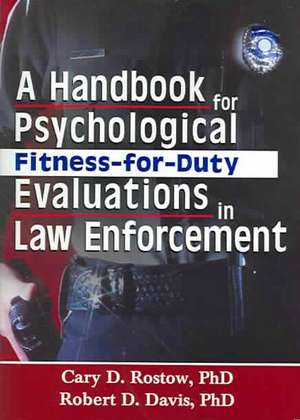A Handbook for Psychological Fitness-for-Duty Evaluations in Law Enforcement
Autor Cary D. Rostow, Robert D. Davisen Limba Engleză Paperback – 14 iul 2004
A Handbook for Psychological Fitness-for-Duty Evaluations in Law Enforcement describes in detail the mechanics of setting up a fitness-for-duty methodology and examines the effectiveness of FFDEs in law enforcement. You’ll find clear instructions for developing a FFDE system from the law enforcement executive’s viewpoint (valuable for attorneys, police psychologists, and civil service board members as well), and an extensive bibliography with particular emphasis on laws and cases that provide guidance to psychological and law enforcement professionals. Several appendices provide examples of documentation that can be used in the evaluation process.
This book brings you reliable information on:
- legal precedents, with a review of legal cases (in language appropriate for law enforcement executives and psychologists)
- the interaction between police culture, psychological assessment, and therapy
- federal laws that impact FFDEs, including the HIPAA, the Americans with Disabilities Act, the Family Medical Leave Act and the Fair Credit Reporting Act
- case law and FFDEs, with emphasis on civil rights laws, labor issues, professional ethical dilemmas, and the psychologist as a potential expert witness
- the proper uses—and the misuses—of the FFDE approach
- police departmental civil liability and the role that the FFDE plays in addressing legal risks
Preț: 230.06 lei
Preț vechi: 289.34 lei
-20% Nou
Puncte Express: 345
Preț estimativ în valută:
44.03€ • 45.80$ • 36.35£
44.03€ • 45.80$ • 36.35£
Carte tipărită la comandă
Livrare economică 14-28 aprilie
Preluare comenzi: 021 569.72.76
Specificații
ISBN-13: 9780789023971
ISBN-10: 0789023970
Pagini: 336
Dimensiuni: 148 x 210 x 22 mm
Greutate: 0.5 kg
Ediția:1
Editura: Taylor & Francis
Colecția Routledge
Locul publicării:Oxford, United Kingdom
ISBN-10: 0789023970
Pagini: 336
Dimensiuni: 148 x 210 x 22 mm
Greutate: 0.5 kg
Ediția:1
Editura: Taylor & Francis
Colecția Routledge
Locul publicării:Oxford, United Kingdom
Cuprins
- Preface and Acknowledgments
- SECTION I: THE HISTORY AND DEVELOPMENT OF POLICE PSYCHOLOGY
- Chapter 1. Law Enforcement Agencies and Police Psychology
- American Policing
- The First American Police Reform Movement
- The Second American Police Reform Movement
- The Third American Police Reform Movement
- U.S. Police Structures
- Early Police Psychological Testing
- Development of Professional Police Psychology and EAPs
- Some Contemporary Issues in Policing
- Chapter 2. Police Culture and Assessment/Therapy Issues
- Culture
- Police-Specific Psychological Assessment, Treatment, and EAP
- Special Issues of Psychotherapy in Police Settings
- Mental Health Programs
- Chapter 3. Law Enforcement Liability and Police Psychology
- The Civil Rights Act of 1871
- Municipal Liability
- Case Law
- Failure to Discipline
- Expert Testimony by the FFDE Provider
- Duty to Warn
- Liability for the Certifying Provider
- The Right to Offer Opinion of Mental Health Before Employment
- SECTION II: THE MECHANICS OF THE FITNESS-FOR-DUTY EVALUATION METHODOLOGY
- Chapter 4. Usefulness of Fitness-for-Duty Evaluations in Law Enforcement Agencies
- The Case of Officer Bob
- The Law Enforcement Executives’ Choices
- The FFDE Option
- Chapter 5. Defining the Fitness-for-Duty Evaluation
- Who May Offer the FFDE Service?
- Positive Risk
- Negative Risk
- Chapter 6. Developing a Fitness-for-Duty Evaluation System
- Friend of the Chief
- General FFDE Goals
- Administrative Conflict of Interest
- Chapter 7. Forms and Styles for the Fitness-for-Duty Evaluation in Law Enforcement
- Officer Instructions
- Officer Personal Information
- Directions for an FFDE Appearance
- Third-Party Observations
- Electronic Recordings
- Copy of the Report
- Defamation
- Misrepresentation on FFDEs
- Résumé Fraud and Free Speech
- FFDE Confidentiality in Court Actions
- Administrative Forms of FFDEs: Internal and External Providers
- Are FFDEs Mandatory?
- Lybarger Admonishment
- Insubordination
- Chapter 8. Assessment: Methods and Procedures
- Processing the Officer into the FFDE Setting
- Explaining the Nature of All Self-Report Materials
- Ending the FFDE Contact with the Officer
- Immediate LE Executive Feedback
- The Minimum Necessary Rule
- Independent Treatment Review Service
- Psychology and Law Enforcement Personnel Methods
- Cognitive Testing and FFDEs
- Introduction to Statistical Considerations for Police Executives
- Predictive Validity
- Clinical, Forensic, and Fitness-for-Duty Evaluations
- Chapter 9. Fitness-for-Duty Report Recommendations
- Special Records Section
- Postevaluation Outcome Assessment and Distortion
- Postassessment Treatment Recommendations
- FFDE Provider Recommendations
- Release of Records to Third Parties
- SECTION III: FORENSIC ISSUES IN FITNESS-FOR-DUTY EVALUATIONS
- Chapter 10. Expert Witnesses and the Defense of Selection/Fitness Decisions
- The Case of Detective Reed
- Federal Rules of Evidence 702
- Examining the Expert’s Methods
- Chapter 11. Reasons for Fitness-for-Duty Evaluations
- The Key Issues
- Reasons for Referral
- Chapter 12. Misuse of Fitness-for-Duty Evaluations
- The Case of Officer Tim
- Improper FFDE Referrals
- SECTION IV: FEDERAL LAW AND FITNESS-FOR-DUTY EVALUATIONS
- Chapter 13. Confidentiality of Psychological Information and t
Notă biografică
Cary D. Rostow, Robert D. Davis
Descriere
While some police psychology books contain a chapter on fitness for duty, this is the first comprehensive publication focused exclusively on psychological fitness-for-duty evaluations (FFDEs) for law enforcement personnel. This book presents detailed instructions for setting up a fitness-for-duty methodology, and examines the effectiveness of FFDEs in law enforcement. This handbook is ideal for professionals as well as for coursework aimed at prospective police or municipal officials, psychologists, students, behavioral science specialists, human rights advocates, and attorneys. A helpful glossary makes the book even more useful for students and those without formal training in psychology or public administration, and several appendices provide examples of documentation to use in the evaluation process.















